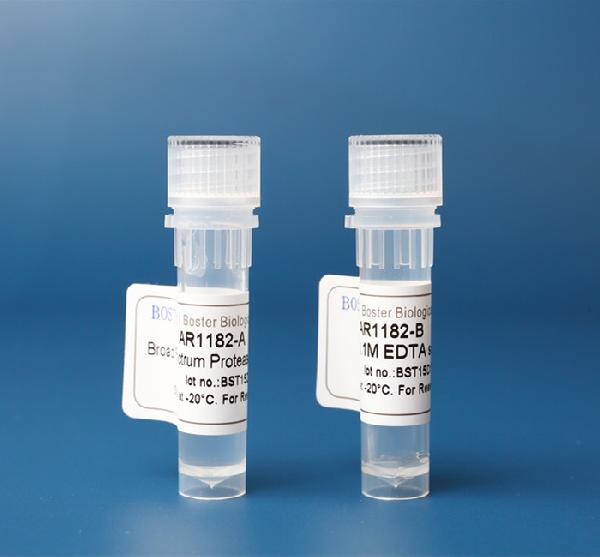This website uses cookies to ensure you get the best experience on our website.
- Table of Contents

Protease inhibitor cocktails are chemical compounds that act to protect and maintain cellular protein composition after lysis of a cell, preventing natural degradation. They play an important role in protein quantification analysis, rendering the protease ineffective while obtaining appropriate protein purification yields. Protease inhibitors are classified by either the type of protease they act on or their mechanism of actions.
Proteases are enzymes that degrade proteins, playing an important role in cellular protein catabolism. Through their interaction with the proteins, they influence their activity and production of bioactive molecules, cellular repair, and the degradation of extracellular material. Proteases are also vital for food digestion, cell division, the blood clotting cascade, apoptosis, and the retroviral life cycle.
Proteases function by hydrolyzing the peptide bonds linking the amino acids together to form the protein. During the process of binding the amino acids together, water is removed. Therefore, by reintroducing water via hydrolysis, the peptide bonds can be broken. The following are examples of proteases that can cause these reactions:
Protease activity is strictly regulated inside the cells via compartmentalization of the proteases or the presence of inhibitors to prevent the indiscriminate digestion of cellular proteins. This controlled cellular environment can be disrupted by cell lysis, allowing all proteins to be degraded.
The protease inhibitors work by either reversibly or irreversibly deactivating the protease by binding to the active site or by modifying the protease’s structure. Not one chemical can deactivate all types of proteases, as most proteases belong to one of four distinct enzyme families based on their functional groups. Therefore, researchers have created “cocktails” of many inhibitor compounds to prevent proteolysis and the degradation of extracted proteins. Protease inhibitors that can be included in these cocktails include the following:
Protease inhibitors and cocktails have a wide range of use in the clinical setting, playing roles in research applications and drug development. They have been known to be used for the following applications:
During research experiments, the protease inhibitors cocktails are added with cell lysis buffers before rupture of the cell membrane. This prevents the already present proteases from rapidly degrading the newly released cellular proteins.

Boster Bio specializes in manufacturing IHC and WB validated antibodies as well as producing high quality ELISA and reagent kits. Our lab provides a broad spectrum protease inhibitor cocktail (Catalog# AR1182) for inhibiting proteases and esterase. It includes AEBSF, aprotinin, bestatin, E-64, leupeptin and pepstatin A stabilized in dimethylsulfoxide (DSMO), as well as EDTA solution for optional metalloprotease inhibition. Boster also offers an EDTA-free broad spectrum protease inhibitor cocktail (Catalog #AR1182-1), which contains the same components of the previous cocktail but without the EDTA solution. Both are protease inhibitor cocktails 100x concentrated stock solutions supplied in a liquid format over the traditional tablets for improved accuracy, solubility, and ease of use. It is recommended to dilute both cocktails by 100-fold in lysis buffer, as 10 μL of the solution is enough to inhibit the degradation of proteins in 1 mL of lysate. These cocktails are designed to protect native cellular proteins from destructive degradation by endogenous proteases following cell lysis, to preserve native cellular proteins to remain intact and functional, to screen extracts for proteolytic activity, and to study proteolysis in the regulation of cellular processes.
*The protease inhibitor cocktail is supplied at a 100X concentration in DMSO and is generally effective when used at a 1X final concentration; however, if a sample contains particularly high levels of proteases, the effective cocktail concentration might require optimization.
Note: (Optional) For inhibition of metalloproteases, add 0.1M EDTA solution in lysis buffer at a ratio of 1:100 and mix well.
There are two important points to consider when deciding between buying premade cocktails or making your own. The first point concerns the overall results. Mixing your own blend of inhibitors can require significant experimentation to perfectly optimize the cocktail for your experiments. Producing small batches can also cause minor inconsistencies, which will affect the overall results. By purchasing a pre-made cocktail not only will you save time, but you’ll also reduce uncertainty and inconsistencies as the production is scaled, and the cocktails have already been tested and optimized.
The second point concerns the expenses required to produce your cocktails. If you require four protease inhibitors, buying them separately will likely mean you’ll receive more than you require. This will lead to waste, but you’ll still have to pay for the full amount. By purchasing a pre-made cocktail, this eliminates this waste and allows you to order a solution with the correct amount of inhibitors you require, saving you money in the long run.
Maximize the impact of your research and gain valuable insights from your samples by utilizing our exceptional service. Get in touch with us today to discuss your project requirements and discover the transformative capabilities of our industry leading Western blotting service.